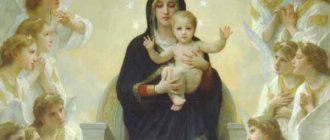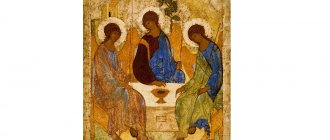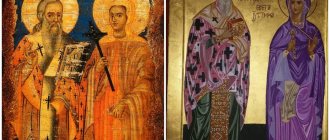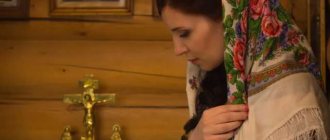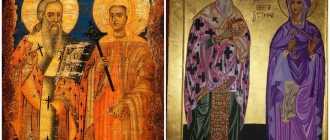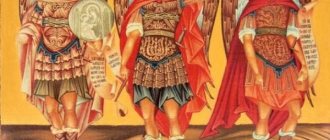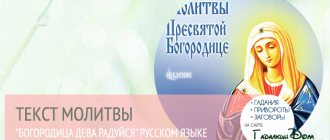Trisagion
, or
the Trisagion Hymn
- the prayer “Holy God, Holy Mighty, Holy Immortal, have mercy on us” (read three times), which is part of the usual beginning of church services.
This prayer is a combination of the song (doxology) of the seraphim in the vision of the prophet Isaiah: “Holy, Holy, Holy is the Lord of hosts!”
(Isa. 6:3), the names of the Persons of the Most Holy Trinity: “God, Mighty and Immortal,” taken from the Holy Scriptures, and the addition of the words of petition “have mercy on us.”
The history of the emergence of prayer according to the Byzantine, Chalcedonian church tradition
The Trisagion is a prayer of ancient origin, dating back to the times of the ancient Christian church, as indicated by John Chrysostom. In the Orthodox Church, prayer begins to be used from the time of the ministry of the Archbishop of Constantinople, Saint Proclus (434-447).
The history of the introduction of the Trisagion into worship is known to us from the legend told in the letters of the Patriarch of Constantinople Acacius (471-479) and other contemporary bishops to the Chalcedonian presbyter Peter Knatheus (who wanted to add to this prayer the addition “crucified for us”), cited by Zonara (12th century) - “crucified for us”).
20 days before Easter, at about 3 o'clock in the afternoon, during a strong earthquake that happened in Constantinople in 438-439, when people on the streets with religious processions and public services were offering repentant prayers for salvation, some boy present in the crowd was unexpectedly raised to heaven and heard the singing of angels: Greek. “Ἅγιος ὁ Θεός, Ἅγιος ἰσχυρός, Ἅγιος ἀθάνατος!” When the boy descended to the ground and told about the miracle, everyone and the patriarch immediately began to sing the Trisagion, adding to it “ἐλέησον ἡμᾶς,” which means “have mercy on us,” after which the earthquake immediately stopped.
As a sign of miraculous deliverance, Empress Pulcheria and her brother Emperor Theodosius the Younger, by imperial decree, introduced the use of the Trisagion during worship, and this decree was solemnly confirmed by the Council of Chalcedon in 451.
So says the legend. According to other sources, the origin of the Trisagion dates back to an earlier time, but in the 5th century it became more famous and was introduced into worship. So, for example, the monk Job explained that the text of the Trisagion is composed of “Holy, Holy, Holy is the Lord of hosts!”
(Is. 6:3) and the verse of the Psalm:
“to the mighty, living God”
(Ps. 41:3), where the word
“living”
(ζών) is replaced by the more sonorous word
“immortal”
(ἀθάνατος).
Nicholas Cabasilas ( Exposition of the Liturgy
, 20) accepts this explanation of Job. Be that as it may, in any case, it is historically reliable that at the first meeting of the IV Ecumenical Council, after the overthrow of Dioscorus, the assembled fathers sang the Trisagion, and since then, therefore, since the half of the 5th century, this song has been sacredly preserved in the Orthodox Church. The sacred origin of the Trisagion is also recognized by the fathers of the Trullo Council in a special 81 canon.
After the Council of Chalcedon, when Monophysitism was solemnly condemned, the Trisagion was distorted. Namely, the mentioned words were added: “crucified for us” (Greek ὁ σταυρωθεὶς δι'ἡμᾶς), in order to counteract the Orthodox teaching and affirm the Monophysite teaching about the second Person of the Holy Trinity. This was done by Peter Knafey (aka Fullon) in the second half of the 5th century. Knafeos is a Constantinople monk, a strict follower of Monophysitism. For this he was expelled from Constantinople. Having gained the favor of Zeno, the king's son-in-law, he went with him to Antioch and here he entered into communication with some of the Apollinarians and formed a strong party against the Antiochian Orthodox Patriarch Martyrius (456-468), whom he eventually forced to resign from the see, and, under with the assistance of his followers, he himself took his place. Having become patriarch, Knafeos, in order to establish Monophysitism in the Antiochian church, ordered the aforementioned words to be added to the Trisagion and to be sung with this addition. In the Orthodox version, the Trisagion refers to all three Persons of the Holy Trinity, but by this addition Knafei wanted to attribute it only to the second Person of the Holy Trinity, to God the Son; wanted, precisely, to reinforce the Monophysite teaching, according to which in Christ there was only one nature, Divine, with which human nature somehow merged, so that the Divinity in Jesus Christ suffered and performed all other human deeds; the body in Christ was some kind of ghostly phenomenon. The addition of the words “crucified for us” to the Trisagion expresses precisely the Monophysite thought that in Christ the Divinity, and not humanity, was crucified and suffered. This teaching not only distorted the dogma of the IV Ecumenical Council, but also restored the heresies of the 2nd and 3rd centuries (Patripassian, Noitian and Sabellian), and consequently, the entire Orthodox teaching about the Persons of the Holy Trinity was overthrown. The teachings of Knapheus were already condemned in 471 at one of the Antioch councils, and Knapheus himself was deposed and expelled; This condemnation was later confirmed at one of the Roman councils in 485. With this (81) rule, the fathers of the Council of Trulla confirmed everything that had been established before them regarding the song of the Trisagion; they condemned the said addition as contrary to piety, proclaimed Peter Knatheus, who invented the addition, a heretic and, following the example of previous Orthodox councils, anathematized (Greek: ἀναθεματίζομεν) all who would dare to accept the said addition and read the Trisagion with it.
In the Roman Catholic Church, the Trisagion is also known and is part of a number of prayer sequences, including the Chaplet to the Divine Mercy. The Latin form is: "Sanctus Deus, Sanctus fortis, Sanctus immortális, miserére nobis." The Trisagion is included in the rite of the Mass of the Mozarabic rite.
Prayer 1
Ἄχραντε, ἀμίαντε, ἄναρχε, ἀόρατε, ἀκαταληπτε, ἀνεξιχνίαστε, ἀναλλοίω ? ῶς οἰκῶν ἀπρόσιτον, ὁ ποιήσας τὸν οὐρανόν, καὶ τὴν γῆν, καὶ τὴν θά λασσαν, καὶ πάντα τὰ δημιουργηθέντα ἐν αὐτοῖς, ὁ πρὸ τοῦ αἰτεῖσθαι τοῖς πᾶσι τὰς αἰτήσεις παρέχων. Σοῦ δεόμεθα, καὶ σὲ παρακαλοῦμεν, Δέσποτα φιλάνθρωπε, τὸν Πατέρα τοῦ Κυρίου, καὶ Θεοῦ, καὶ Σωτῆρος ἡμῶν Ἰησοῦ Χριστοῦ, τοῦ δι' ἡμᾶς το ὺς ἀνθρώπους, καὶ διὰ τὴν ἡμετέραν σωτηρίαν κατελθόντος ἐκ τῶν οὐ ?? , καὶ ἐνδόξου, Θεοτόκου, ὃς πρότερον μὲν λόγοις διδάσκων, ὕστερον δὲ καὶ ἔργοις ὑποδεικνύς, ἡνίκα τὸ σωτήριον ὑφίστατο πάθος, παρέσχε ? ? τῶνἰδίων ἁμαρτημάτων, καὶ τῶν τοῦ λαοῦ ἀγνοημάτων. ?? ?? ῆς, ἐν ᾗ, μετὰ τὸ ἀναληφθῆναι τὸν Κύριον ἡμῶν, Ἰησοῦν Χριστὸν εἰ ς τοὺς οὐρανούς, καὶ καθεσθῆναι ἐν δεξιᾷ σοῦ Θεοῦ καὶ Πατρός, κατέπεμψε τὸ ἅγιον Πνεῦμα ἐπὶ τοὺς ἁγίους αὐτοῦ μαθητὰς κ αὶ Ἀποστόλους, ὃ καὶ ἐκάθισεν ἐφ' ἕνα ἕκαστον αὐτῶν καὶ ἐπλήσθησαν All rights reserved. ὰ μεγαλεῖά σου, καὶ προεφήτευσαν. ἡμῶν ν, καὶ κατακρίτων, καὶ ἐπίστρεψον τὴν αἰχμαλωσίαν τῶν ψυχῶν ἡμῶν, τδ ν οἰκείαν συμπάθειαν ἔχων ὑπὲρ ἡμῶν πρεσβεύουσαν. Δέξαι ἡμᾶς προσπίπτοντάς σοι, καὶ βοῶντας τό, Ἡμάρτομεν. Ἐπὶ σὲ ἐπερρίφημεν ἐκ μήτρας, ἀπὸ γαστρὸς μητρὸς ἡμῶν, Θεὸς ἡμ ῶν σὺ εἶ, ἀλλ' ὅτι ἐξέλιπον ἐν ματαιότητι αἱ ἡμέραι ἡμῶν, γεγυμνώμ εθα τῆς σῆς βοηθείας, ἐστερήμεθα ἀπὸ πάσης ἀπολογίας. Ἀλλὰ θαρροῦντες τοῖς οἰκτιρμοῖς σου, κράζομεν· Ἁμαρτίας νεότητος ἡμῶν, καὶ ἀγνοίας μὴ μνησθῇς, καὶ ἐκ τῶν κρυφίων ἡμῶν καθάρισον ἡμᾶς. Μὴ ἀπορρίψῃς ἡμᾶς εἰς καιρὸν γήρως, ἐν τῷ ἐκλείπειν τὴν ἰσχὺν ἡμῶν, μὴ ἐγκαταλίπῃς ἡμᾶς, πρίν ἡμᾶς εἰς τὴν γῆν ἀποστρέψαι, ἀξ ? ι. Ἐπιμέτρησον τὰς ἀνομίας ἡμῶν τοῖς οἰκτιρμοῖς σου, ἀντίθες τὴν ἄβυσσον τῶν οἰκτιρμῶν σου, τῷ πλήθει τῶν πλημμελημάτων ἡμῶν. Ἐπίβλεψον ἐξ ὕψους ἁγίου σου, Κύριε, ἐπὶ τὸν λαόν σου τὸν περιεστ ῶτα, καὶ ἀπεκδεχόμενον τὸ παρὰ σοῦ πλούσιον ἔλεος, ἐπίσκεψαι ἡμᾶς ἐν τῇ χρηστότητί σου, ῥῦσαι ἡμᾶς ἐκ τῆς καταδυναστείας τοῦ Διαβόλο υ, ἀσφάλισαι τὴν ζωὴν ἡμῶν τοῖς ἁγίοις καὶ ἱεροῖς νόμοις σου. Ἀγγέλῳ πιστῷ φύλακι παρακατάθου τὸν λαόν σου, πάντας ἡμᾶς συνάγαγε τὴν ὐτοῖς καὶ ὑμῖν τὰ ἁμαρτήματα, καθάρισον ἡμᾶς τῇ ἐνεργείᾳ τοῦ ἁγί ου σου Πνεύματος, διάλυσον τὰς καθ΄ ἡμῶν μηχανὰς τοῦ ἐχθροῦ.
The history of the emergence of prayer according to the ancient Eastern, non-Chalcedonian church tradition
The origin of the Trisagion Song by the Ancient Eastern churches is traced to the prayer of Joseph of Arimathea, who stood under the cross of the crucified Jesus Christ and prayed with the words that later became the Trisagion Song: “Holy God, Mighty Saint, Immortal Saint, who was crucified for us, have mercy on us.” Unlike the churches of the Chalcedonian tradition, the Trisagion is sung not to the Trinity, but to Jesus Christ - one of the three Persons of GodK: Wikipedia: Articles without sources (type: not specified)[ source not specified 2108 days
]. This makes the Trisagion an expressive anti-Arian and Christological, anti-Nestorian confession, where Christ is recognized as a strong and immortal God, and not a creature alien to God or a person in whom God dwelt. On the feast of Pentecost, the Trisagion is sung to the Holy Spirit who descended on the apostles.
Apologists of the non-Chalcedonian confession criticize the Chalcedonians for their Trinitarian interpretation of the Trisagion Song and the “fairytale” story about the origin of the song. The division of the three parts of the song according to the Persons of the Trinity, namely, the Father God, the mighty Son, the immortal Holy Spirit, presents the matter in an absurd, close to heretical light, as if the Son and the Holy Spirit are not God, the Father and the Holy Spirit are not mighty, but the Father and The son is not immortal. However, we must not forget that St. The apostles, for example, in their sermons often used the name “God” specifically in relation to God the Father, not always directly using it immediately in relation to God the Son (see, for example, 1 Pet. 1:3, 1- f Cor.1:3); at the same time, of course, they considered Christ God (for example, John 20:28, Acts 20:28).[1]
Prayer 2
Κύριε Ἰησοῦ Χριστέ, ὁ Θεὸς ἡμῶν, ὁ τὴν σὴν εἰρηνην δεδωκὼς τοῖ ?? μῖν συμπαρών, εἰς κληρονομίαν ἀναφαίρετον τοῖς πιστοῖς ἀεὶ παρέχων, ἐμφανέστερον δὲ ταύτην τὴν χάριν τοῖς σοῖς μαθηταῖς καὶ Ἀποστόλοι ς σήμερον καταπέμψας , καὶ τὰ τούτων χείλη πυρίναις στομώσας γλώσσαις, ἀ νθρώπων τὴν θεογνωσίαν, ἰδίᾳ διαλέκτῳ, εἰς ἀκοὴν ὠτίου δεξάμενοι, ? λάγημεν, καὶ τῇ τῶν αἰσθητῶν καὶ πυρίνων γλωσσῶν διανομῇ, καὶ ὑπερ φυεῖ ἐνεργείᾳ, τὴν εἰς σὲ πίστιν ἐμαθητεύθημεν, καὶ σὲ θεολογεῖν, σὺ ν τῷ Πατρὶ καὶ τῷ ἁγίῳ Πνεύματι, ἐν μιᾷ Θεότητι, καὶ δυνάμει, καὶἐξ ουσίᾳ κατηυγάσθημεν. ? ἀπαράλλακτος, καὶ ἀμετακίνητος χαρακτηρ, ἡ πηγὴ τῆς σωτηρίας καὶ τῆς ? ς δεῖ, καὶ ὑπὲρ ὧν χρὴ προσεύχεσθαι. Σὺ γὰρ εἶ, ὁ γινώσκων τὸ πολὺ τῶν ἁμαρτιῶν μου πλῆθος, ἀλλ' ἡ σ ὴ εὐσπλαγχνία νικήσει τούτων τὸ ἄμετρον· ἰδοὺ γὰρ φϿόβῳ παρίσταμαί σμαί ι, εἰς τὸ πέλαγος τοῦ ἐλέους σου τὴν ἀπόγνωσιν ἀπορρίψας τῆς ψυχῆ ς μου. Κυβέρνησόν μου τὴν ζωήν, ὁ πᾶσαν ῥηματι τὴν κτίσιν ἀρρήτδ ? ὁδόν, ἐν ᾗ πορεύσομαι Πνεῦμα σοφίας σου, τοῖς ἐμοῖς παράσχου διαλογι σμοῖς, Πνεῦμα συνέσεως τῇ ἀφροσύνῃ μου δωρούμενος. φόβου τοῖς ἐμοῖς ἐπισκίασον ἔργοις καὶ Πνεῦμα εὐθὲς ἐγκαίνισον ἐν τοῖς ἐγκάτοις μου, καὶ Πνεύματι ἡγεμονικῷ τὸ τῆς δια νοίας μου στήριξον ὀλισθηρόν, ἵνα καθ' ἑκάστην ἡμέραν, τῷ Πνεύματί σο ? τολάς σου, καὶ τῆς σῆς ἀεὶ μνημονεύειν ἐνδόξου, καὶ ἐρευνητικῆς τεπραγμέν ? ἀλλὰ τῶν μελλόντων ὀρέγεσθαι τῆς ἀπολαύσεως ἐνίσχυσον θησαυρῶν. Σὺ γὰρ εἶπας, Δέσποτα, ὅτι πέρ, ὅσα ἂν τις αἰτήσηται ἐν τῷ ὀνόματί σ ? ? ν ἱκετεύω ἀγαθότητα. Ὅσα ηὐξάμην, ἀπόδος μοι εἰς σωτηρίαν. Ναί, Κύριε, ὁ πάσης εὐεργεσίας πλουσιοπάροχος δοτὴρ ἀγαθός, ὅτι σὺ εἶ ὁ διδοὺς ὑπερεκπερισσοῦ, ὧν αἰτούμεθα. ? ῶν κοινωνός, καὶ τοῖς κάμπτουσι πρὸς σὲ γόνυ, ἐπικαμπτόμενος φιλευ σπλάγχνως, ἱλασμός τε γενόμενος τῶν ἁμαρτιῶν ἡμῶν. → ? σου, σκέπασον αὐτοὺς ἐν τῇ σκέπῃ τῶν πτερύγων σου, μὴ παρίδῃς ἔρ γα τῶν χειρῶν σου. ?? ?? ἑαυτῶν, Δέσποτα, χεῖρας. Ἄφες ἡμῖν τὰ παραπτώματα, καὶ προσδεχόμενος ἡμῶν τὰς γονυπετεῖς δεήσεις, ἔκτεινον πᾶσιν ἡμῖν χεῖρα βοηθείας, πρόσδεξαι τὴν εὐχὴν πάν των, ὡς θυμίαμα δεκτόν, ἀναλαμβανόμενον ἐνώπιον τῆς σῆς ὑπεραγάθου α σιλείας.
Liturgical use in the Byzantine church tradition
The Trisagion is used as part of the usual beginning; in conjunction with the Trisagion→Holy Trinity→Our Father in various places of worship; at the end of the great doxology; at the Liturgy of the Catechumens before the reading of the Prokemna and the Apostle.
At the end of the funeral service, after the singing of Eternal Memory, when the coffin is carried out of the church feet first, the Trisagion is sung.
At the Liturgy
At the Liturgy, the Trisagion is performed in the following order. If the service is not a bishop’s service, then the choir sings the Trisagion in its entirety three times, then “Glory, and now,” and finishes singing “Holy Immortal One, have mercy on us.”
and once again sings the Trisagion. If a bishop serves, the order changes:
- First, the Trisagion is sung by the choristers.
- Then it is sung by the concelebrants of the bishop and the clergy at the altar. The bishop, having received the dikiri from the subdeacon, makes the sign of the cross over the Gospel. Having accepted the cross from the second priest, the bishop with a dikiri and a cross goes out to the pulpit.
- At this time, the Trisagion is sung in recitative by the choristers. The bishop begins to bless on three sides with the prayer “Look from heaven, O God, and see, and visit this vineyard, and establish it, and plant it with Your right hand
. - When the bishop overshadows the worshipers (to the west), the choir sings “Holy God”
, when to the south -
“Holy Mighty”
, when to the north -
“Holy Immortal, have mercy on us”
. - The bishop goes to the altar, the Trisagion is sung by the choristers.
- Next, the Trisagion is sung at the altar, when the bishop, having blessed the high place with the dikiriy, gives it away, receives the trikirium and overshadows the concelebrants with it from the high place to the west, south and north.
- The singers sing “Glory, even now
,
“Holy Immortal One, have mercy on us,”
and again the Trisagion.
Thus, during the hierarchal Liturgy the Trisagion is sung seven and a half times.
On some days of the liturgical year, the Trisagion is replaced by other hymns. On the following days, which in the past were traditionally set aside for the baptism of catechumens, instead of the Trisagion, “Those who were baptized into Christ, who put on Christ, alleluia”
(see Gal. 3:27):
- Nativity;
- Epiphany;
- Lazarus Saturday;
- Holy Saturday;
- Easter and Holy Week;
- Pentecost.
On holidays dedicated to the Cross of Christ, instead of the Trisagion, the hymn “We venerate Your Cross, O Master, and glorify Your Holy Resurrection”
:
- Elevation;
- The origin of the honest trees of the Life-Giving Cross;
- The week of veneration of the cross.
Prayer 3
Ἡ ἀενάως βρύουσα ζωτικὴ καὶ φωτιστικὴ πηγή, ἡ συναΐδιος τοῦ Πατρὸς δημιουργικὴ δύναμις, ὁ πᾶσαν τὴν οἰκονομίαν, διὰ τὴν τῶν βροτῶν σω τηρίαν, ὑπερκάλλως πληρώσας, Χριστέ, ὁ Θεὸς ἡμῶν. Ὁ θανάτου δεσμοὺς ἀλύτους, καὶ κλεῖθρα ᾍδου διαρρήξας, πονηρῶν δὲ ?? ἱερεῖον, τὸ σῶμα δοὺς τὸ ἄχραντον εἰς θυσίαν, τὸ πάσης ἁμαρτίας ἄψ αυστόν τε καὶ ἄβατον, καὶ διὰ τῆς φρικτῆς ταύτης, καὶ ἀνεκδιηγήτου ἱ ερουργίας, ἡμῖν αἰώνιον χαρισάμενος, ὁ εἰς ᾍδου καταβάς, καὶ μοχλοὺς αἰων ἀ καὶ ιραῖς ζόφου δεσμεύσας ἐν ταρτάρῳ, καὶ πυρὶ ἀσβέστῳ, καὶ σκότῳ ἐξωτέ ρῳ, διὰ τῆς ἀπειροδυνάμου σου κατασφαλισάμενος ἰσχύος, ἡ μεγαλώνυμος σοφία τοῦ ?? ὺς ἐν σκότει, καὶ σκιᾷ θανάτου καθημένους. Σύ, δόξης ἀενάου Κύριε, καὶ Πατρὸς ὑψίστου Υἱὲ ἀγαπητέ, ἀΐδιον φῶ , ? ν καὶ ἀδελφῶν ἡμῶν, καὶ τῶν λοιπῶν συγγενῶν κατὰ σάρκα, καὶ ?? νῦν, ὅτι ἐν σοὶ πάντων τὸ κράτος, καὶ ἐν τῇ χειρί σου κατέχεις πάντ α τὰ πέρατα τῆς γῆς. → ?? νης τε καὶ πάλιν λυομένης, ζωῆς τε καὶ τελευτῆς, τῆς ἐνταῦθα διαγωγ ῆς, καὶ τῆς ἐκεῖθεν μεταστάσεως, ὁ χρόνους μετρῶν τοῖς ζῶσι, καὶ ἀ ?? ν, καὶ τὰ μέλλοντα λυσιτελῶς διοικῶν, ὁ τοὺς θανάτου κέντρῳ πληγέντ ας, ἀναστάσεως ἐλπίσι ζωογονῶν. ?? τῶν περάτων τῆς γῆς, καὶ τῶν ἐν θαλάσῃ μακράν, ὁ καὶ ἐν ταύτῃ τῇ ἐσχάτῃ, καὶ μεγάλῃ καὶ σωτηρίῳ ἡμέρᾳ τῆς Πεντηκοστῆς, τὸ μυστὴρ ιον τῆς ἁγίας, καὶ ὁμοουσίου, καὶ συναϊδίου, καὶ ἀδιαιρέτου, καὶ ἀσυγχύτου Τριάδος ὑποδείξας κ αὶ τὴν ἐπιφοίτησιν καὶ παρουσίαν τοῦ ἁγίου καὶ ζωοποιοῦ σου Πνεύμα ?? καὶ ὶ ὁμολογητάς καὶ κήρυκας τῆς ἀληθοῦς ἀναδείξας θεολογίας, ὁ καὶ ἐν αὐτῇ τῇ παντελείῳ Ἑορτῇ καὶ σωτηριώ δει, ἱλασμοὺς ἱκεσίους, ὑπὲρ τῶν κατεχομένων ἐν ᾍδῃ, καταξιώσας δέχ εσθαι, μεγάλας τε παρέχων ἡμῖν ἐλπίδας, ἄνεσιν τοῖς κατοιχομένοις τ ῶν κατεχόντων αὐτοὺς ἀνιαρῶν, καὶ παραψυχὴν παρὰ σοῦ καταπέμπεσθαι. Ἐπάκουσον ἡμῶν τῶν ταπεινῶν, οἰκτρῶν δεομένων σου, καὶ ἀνάπαυσο ? ἐν τόπῳ χλοερῷ, ἐν τόπῳ ἀναψύξεως, ἔνθα ἀπέδρα πᾶσα ὀδύνη, λύπη, καὶ στεναγμός, καὶ κατάταξον τὰ πνεύματα αὐτῶν ἐν σκηναῖς Δικαίων, καὶ εἰρήνης καὶ ἀνέσεως ἀξίωσον αὐτούς, ὅτι οὐχ οἱ νεκροὶ αἰνέσο ? ιν σοι, ἀλλ' ἡμεῖς οἱ ζῶντες εὐλογοῦμέν σε καὶ ἱκετεύομεν, καὶ τὰ ? ν.
Liturgical use in the ancient Eastern church tradition
In the liturgical practice of the Ancient Eastern Orthodox Churches, in particular the Armenian Apostolic Church, a tradition has developed of using different endings of the Trisagion hymn, depending on the event celebrated at the Liturgy, an addition is made to “Holy God, Mighty Holy, Immortal Holy”, indicating a particular biblical event.
So in the Sunday Liturgy and on Easter it is added: “... who rose from the dead, have mercy on us.”
During the non-Sunday Liturgy and on the feasts of the Holy Cross: “... who was crucified for us, …”.
On the Annunciation or Epiphany (Christmas and Epiphany): “... who appeared for us, …”.
On the Ascension of Christ: “... that he ascended in glory to the Father, …”.
On Pentecost (Descent of the Holy Spirit): “... who came and rested on the apostles, …”.
And others…
Links
- Bishop Nikodim (Milash).
Morning prayers Initial prayers · Rising from sleep · Rising from sleep · Psalm 50 · Nicene-Constantinopolis Creed · God cleanse · Lord Almighty · We bless You · I sing of grace · Much-merciful and All-Merciful · Holy Angel · Most Holy Lady · Pray to God for me · Song to the Most Holy Theotokos · Troparion to the Cross · Prayer for the living · Prayer for the dead · It is worthy to eat · End of prayers Prayers for the future Initial prayers · Have mercy on us, Lord · Eternal God · Almighty, the Word of the Father · Lord, Heavenly King · What will I bring to Thee · Lord our God · Lord, do not deprive me · Lord Jesus Christ · To Thee, Most Pure Mother of God · Good Mother of the Good King · Guardian Angel of Christ · Chosen Governor · My Hope Father · Lord Lover of Mankind · Enlighten my eyes · May God rise · Weaken, forsake · Those who hate and offend · Everyday confession of sins · In Thy hand, Lord Prayers for Holy Communion Initial prayers · Psalm 22 · Psalm 23 · Psalm 115 · Alleluia · Despise my iniquities · Psalm 50 · Canon for Holy Communion · It is worthy to eat · The Trisagion according to the Lord's Prayer · Have mercy on us, O Lord · Lord, have mercy 40 times · Although eat, O man · Master Lord Jesus Christ · Lord my God, we know · One pure and incorruptible Lord · For in Your terrible and impartial judgment the Judgment Seat stands · Master Lord Jesus Christ our God · We know, Lord · From foul lips · God, weaken · I am not pleased, Master Lord · Prayer 10, St. John Chrysostom · I stand before the doors of Thy temple · I believe, O Lord, and I confess · Behold, I draw near · Thy secret Supper this day · I am horrified by the God-giving Blood · Thou hast made me glad with love · Lord, Lover of mankind, O Lord Prayers of Thanksgiving for Holy Communion Glory to Thee, God, three times · I thank Thee, Lord · Master Christ God, King of the ages · Who has given me Thy flesh as food · Thy Holy Body, O Lord · Prayer 5th, to the Most Holy Theotokos · Now you forgive · Trisagion · Our Father · Holy Troparion. John Chrysostom · You received from heaven · The intercession of Christians is shameless · Lord have mercy 12 times · Dismissal Code of regular prayers in the temple Daily liturgical circle · Octoechos · Menaion · Triodion Prayers for different occasions Breviary · Book of prayers · Akathist · Canon · Psalter · Prayers to the saints Types of prayers Public Prayer · Home Prayer · Personal Prayer · Repentance · Promise · Supplication · Worship · Kiss · Greeting · Gratitude · Doxology · Reading Prayers · Singing Prayers · Mental Prayer · External Prayer · Distracted Prayer · Sinful Prayer · Passionate Prayer · Blasphemous Prayer Category ·
Portal
Prayer to the Holy Trinity in Greek
People, who can post Orthodox prayers here in these languages with transcription in Russian?
- Peter:
- 19:05 | 12/28/2009 | reply #2
DeIpara VIRGO Ave, gracia plena Maria DOminus tekum benedIkta tu in muliEribus et benedIctus frUctus vEntris tui quia SalvaOrem peperIsti animArum nostrArum - Rejoice to the Virgin Mary.
- Oleg:
- 19:05 | 12/28/2009 | reply #3
and anything else?
- Tatiana:
- 20:00 | 12/28/2009 | reply #4
VasilEv Uranie, parAklite to pnEuma tis alifies, o pantahU parOn ke ta panta plirOn, o fisauros ton agathon ke zois horigos, elfE ke skInoson en imIn ke kafaArison imAs apo pasis kilIzos, ke soson agafe tas psychas imOn. -Heavenly King in Greek, but why do you need it? (only all f - interdental)
- Oleg:
- 20:01 | 12/28/2009 | reply #5
I wanted to learn a couple of prayers in sacred ancient languages.
- Tatiana:
- 20:02 | 12/28/2009 | reply #6
Axion estIn os alifOs makarIzin se timeotOkon tin aimakAriston ke panamOmiton ti mitEra tu Feu imOn, tin timiotEron ton cherubim ke endoxoteron asingrItos ton seraphim, tin asiaffOros feon logon tekUson, tin Ontos TheotOkon se megalinumE. - It's worthy to eat.
- Tatiana:
- 20:04 | 12/28/2009 | reply #7
It seems to me that I messed something up, I’m writing from memory. ((
- Denis:
- 20:05 | 12/28/2009 | reply #8
I can recommend this source https://ihtys.narod.ru/, but first you need to learn to read Greek.
- Denis:
- 20:05 | 12/28/2009 | reply #9
Πάτερ Πάτερ ἡµῶν ὁ ἐν τοῖς οὐρανοῖς, ἁγιασθήτω τὸ ὄνοµά σου, ἐλ ἡ βασιλεία σου, γενηθήτω τὸ θέληµά σου, ὡς ἐν οὐρανῷ καὶ ἐπὶ γῆ ς. ? ? αὶ µὴ εἰσενέγκῃς ἡµᾶς εἰς πειρασµόν, ἀλλὰ ῥῦσαι ἡµᾶς ἀπὸ τοῦ π ονηροῦ.
Transcription and translation
PATER imOn - Our Father O en tis Uranis - In the heavens AgiastIto to Onoma su - Let Your Name be sanctified EltAto and vasIlia su - Let Your Kingdom come Gennet Ito to to Telima su - Let Your will come true Os en urano ke Epi gis —- As in the sky and on earth Ton Arton imOn ton epIusion —- Our daily bread Dos imIn simeron —- Give us today Ke Afes imInta ofeilimata imOn —- And leave us our debts Oske imis afikamen —- As we left Tis ofIletes imOn —- To our debtors ke mi isenkis imAs is pirasmOn —- And do not lead us into temptation Alla rrise imAs aPO tu poniru —- But deliver us from evil (Matthew 6:9-13)
?? ? ας ἡµῶν, καὶ γὰρ αὐτοὶ ἀφίοµεν παντὶ ὀφείλοντι ἡµῖν· καὶ µὴ εἰσενέ γκῃς ἡµᾶς εἰς πειρασµόν.
Transcription and translation
PATER —- Father Agiasto to Onoma su — Let Your Name be sanctified EltAto and vasIlia su — Let Your Kingdom come Ton Arton imOn ton epiusion didu imIn to kat imEran — give us our daily bread every day Ke Afes imIn tas amartIas imOn - and forgive us our sins Kegar autOi afIomen panTI ofIlonti imIn - for we also forgive every debtor to ours Kemi
- Denis:
- 20:05 | 12/28/2009 | reply #10
Pater Pater noster, qui es in caelis, sanctificetur nomen tuum. Adveniat regnum tuum. Fiat voluntas tua, sicut in caelo et in terra. Panem nostrum quotidianum da nobis hodie. Et dimitte nobis debita nostra, sicut et nos dimittimus debitoribus nostris. Et ne nos inducas in tentationem, sed libera nos a malo. Amen.
Transcription and translation
Pater noster, qui es in chelis - Our Father who dwells in heaven. sanktifichEtur nomen tuum. - Hallowed be Thy name adveniat renyum tUum. - Thy kingdom come fiat volYuntas tua - Thy will be done sikut in chElo in terra. - both in heaven and on earth panem nostrum cotidiAnum - our daily bread and nobis Odie. – give us today et demitte nobis debita nostra – and leave us our debts sikut et nos demIttimus – just as we leave debitOribus nostris. - our debtors do not have a nose indukas - and do not lead us into intentions - into temptation Sed Libera nose a little. - but deliver us from evil Amen - Amen
- Konstantin:
- 22:04 | 12/28/2009 | reply #11
Excerpt characterizing the Trisagion
Having burst into Smolensk, which seemed to them the promised land, the French killed each other for provisions, robbed their own stores and, when everything was looted, ran on.
Everyone walked, not knowing where or why they were going. Napoleon's genius knew this even less than others, since no one ordered him. But still, he and those around him followed their long-standing habits: they wrote orders, letters, reports, ordre du jour [daily routine]; called each other: “Sire, Mon Cousin, Prince d'Ekmuhl, roi de Naples” [Your Majesty, my brother, Prince of Ekmuhl, King of Naples.] etc. But the orders and reports were only on paper, nothing was carried out according to them, because it could not be carried out, and, despite calling each other majesties, highnesses and cousins, they all felt that they were pathetic and disgusting people who had done a lot of evil, which now had to be paid for. And, despite the fact that they pretended to care about the army, they each thought only about themselves and how to quickly leave and save themselves. The actions of the Russian and French troops during the return campaign from Moscow to the Neman are similar to a game of blind man's buff, when two players are blindfolded and one occasionally rings a bell to notify the catcher. At first, the one who is caught calls without fear of the enemy, but when he gets into trouble, he, trying to walk silently, runs away from his enemy and often, thinking of running away, goes straight into his arms. At first, Napoleonic troops still made themselves felt - this was during the first period of movement along the Kaluga road, but then, having got out onto the Smolensk road, they ran, pressing the bell with their hand, and often, thinking that they were leaving, ran straight into the Russians. Given the speed of the French and the Russians behind them, and as a result of the exhaustion of the horses, the main means of approximate recognition of the position in which the enemy was located - cavalry patrols - did not exist. In addition, due to the frequent and rapid changes in the positions of both armies, the information that was available could not keep up in time. If the news came on the second day that the enemy army was there either on the first day or on the third, when something could have been done, this army had already made two marches and was in a completely different position. One army fled, the other caught up. From Smolensk the French had many different roads ahead of them; and, it would seem, here, after standing for four days, the French could find out where the enemy is, figure out something advantageous and do something new. But after a four-day stop, the crowds again ran, not to the right, not to the left, but, without any maneuvers or considerations, along the old, worse road, to Krasnoe and Orsha - along the broken trail. Expecting the enemy from behind rather than in front, the French fled, spread out and separated from each other by a distance of twenty-four hours. The emperor ran ahead of everyone, then the kings, then the dukes. The Russian army, thinking that Napoleon would take the right beyond the Dnieper, which was the only reasonable thing, also moved to the right and reached the high road to Krasnoe. And then, as if in a game of blind man's buff, the French stumbled upon our vanguard. Suddenly seeing the enemy, the French became confused, paused from the surprise of fear, but then ran again, leaving their comrades behind. Here, as if through a formation of Russian troops, three days passed, one after another, separate parts of the French, first the viceroy, then Davout, then Ney. They all abandoned each other, abandoned all their burdens, artillery, half the people and ran away, only at night going around the Russians in semicircles on the right. Ney, who walked last (because, despite their unfortunate situation or precisely as a result of it, they wanted to beat the floor that had hurt them, he began tearing up the walls of Smolensk that did not interfere with anyone), - who walked last, Ney, with his ten-thousandth corps, came running to Orsha to Napoleon with only a thousand people, abandoning all the people and all the guns and at night, sneaking through the forest through the Dnieper. From Orsha they ran further along the road to Vilna, playing blind man's buff in the same way with the pursuing army. On the Berezina there was confusion again, many drowned, many surrendered, but those who crossed the river ran on. Their main leader put on a fur coat and, getting into the sleigh, rode off alone, leaving his comrades. Those who could, also left; those who could not, gave up or died. It would seem that in this campaign of flight of the French, when they did everything they could to destroy themselves; when not a single movement of this crowd, starting from the turn onto the Kaluga road and until the flight of the commander from the army, made the slightest sense - it would seem that during this period of the campaign it is no longer possible for historians, who attribute the actions of the masses to the will of one person, to describe this retreat in their meaning. But no. Mountains of books have been written by historians about this campaign, and everywhere the orders of Napoleon and his profound plans are described - the maneuvers that led the army, and the brilliant orders of his marshals. The retreat from Maloyaroslavets when he is given the road to an abundant land and when that parallel road along which Kutuzov later pursued him is open to him, the unnecessary retreat along the ruined road is explained to us for various profound reasons. For the same profound reasons, his retreat from Smolensk to Orsha is described. Then his heroism at Krasny is described, where he allegedly prepares to take the battle and command himself, and walks with a birch stick and says: - J'ai assez fait l'Empereur, il est temps de faire le general, [I have already imagined the emperor , now is the time to be a general.] - and, despite this, immediately after this he runs on, leaving the scattered parts of the army behind to the mercy of fate. Then they describe to us the greatness of the soul of the marshals, especially Ney, the greatness of the soul, which consists in the fact that at night he made his way through the forest bypassing the Dnieper and, without banners and artillery and without nine-tenths of the army, ran to Orsha. And finally, the last departure of the great emperor from the heroic army seems to us by historians as something great and brilliant. Even this last act of flight, in human language is called the last degree of meanness, which every child learns to be ashamed of, and this act in the language of historians receives justification. Then, when it is no longer possible to stretch such elastic threads of historical reasoning any further, when an action is already clearly contrary to what all humanity calls good and even justice, the saving concept of greatness appears among historians. Greatness seems to exclude the possibility of measuring good and bad. For the great there is no bad. There is no horror that can be blamed on someone who is great. - “C’est grand!” [This is majestic!] - say historians, and then there is no longer either good or bad, but there is “grand” and “not grand”. Grand is good, not grand is bad. Grand is a property, according to their concepts, of some special animals, which they call heroes. And Napoleon, walking home in a warm fur coat from the dying not only of his comrades, but (in his opinion) of the people he brought here, feels que c'est grand, and his soul is at peace. “Du sublime (he sees something sublime in himself) au ridicule il n'y a qu'un pas,” he says. And the whole world has been repeating for fifty years: “Sublime! Grand! Napoleon le grand! Du sublime au ridicule il n'y a qu'un pas.” [majestic... From majestic to ridiculous there is only one step... Majestic! Great! Napoleon the Great! It’s only a step from the majestic to the ridiculous.] And it never occurs to anyone that recognition of greatness, immeasurable by the measure of good and bad, is only recognition of one’s insignificance and immeasurable smallness. For us, with the measure of good and bad given to us by Christ, there is nothing immeasurable. And there is no greatness where there is no simplicity, goodness and truth. Which of the Russian people, reading descriptions of the last period of the campaign of 1812, did not experience a heavy feeling of annoyance, dissatisfaction and uncertainty. Who hasn’t asked himself questions: how they didn’t take and destroy all the French, when all three armies surrounded them in superior numbers, when the frustrated French, starving and freezing, surrendered in droves, and when (as history tells us) the goal of the Russians was precisely that to stop, cut off and take prisoner all the French. How did that Russian army, which was weaker in number than the French, fight the Battle of Borodino, how did this army, which surrounded the French on three sides and had the goal of taking them away, did not achieve its goal? Do the French really have such a huge advantage over us that we, having surrounded them with superior forces, could not beat them? How could this happen? History (the one called by this word), answering these questions, says that this happened because Kutuzov, and Tormasov, and Chichagov, and this one, and that one, did not make such and such maneuvers. But why didn't they do all these maneuvers? Why, if they were to blame for not achieving the intended goal, why were they not tried and executed? But, even if we admit that the failure of the Russians was due to Kutuzov and Chichagov, etc., it is still impossible to understand why and in the conditions in which the Russian troops were located at Krasnoye and near Berezina (in both cases the Russians were in excellent forces), why was the French army with its marshals, kings and emperors not captured, when this was the goal of the Russians? The explanation of this strange phenomenon by the fact that Kutuzov prevented the attack (as Russian military historians do) is unfounded because we know that Kutuzov’s will could not keep the troops from attacking near Vyazma and near Tarutin. Why was that Russian army, which with weaker forces won a victory at Borodino over the enemy in all its strength, at Krasnoe and near Berezina with superior forces defeated by frustrated crowds of the French? If the goal of the Russians was to cut off and capture Napoleon and the marshals, and this goal was not only not achieved, but all attempts to achieve this goal were each time destroyed in the most shameful way, then the last period of the campaign quite rightly seems to be close to the French victories and is completely unfairly presented by Russian historians as victorious. Russian military historians, to the extent that logic is obligatory for them, involuntarily come to this conclusion and, despite lyrical appeals about courage and devotion, etc., must involuntarily admit that the French retreat from Moscow is a series of victories for Napoleon and defeats for Kutuzov. But, leaving national pride completely aside, one feels that this conclusion itself contains a contradiction, since a series of victories for the French led them to complete destruction, and a series of defeats for the Russians led them to the complete destruction of the enemy and the purification of their fatherland. The source of this contradiction lies in the fact that historians who study events from letters of sovereigns and generals, from reports, reports, plans, etc., have assumed a false, never-existent goal for the last period of the war of 1812 - a goal that supposedly consisted of to cut off and catch Napoleon with the marshals and the army. This goal never existed and could not exist, because it had no meaning, and achieving it was completely impossible. This goal did not make any sense, firstly, because Napoleon’s frustrated army fled from Russia as quickly as possible, that is, it fulfilled the very thing that every Russian could wish for. Why was it necessary to carry out various operations on the French, who fled as quickly as they could? Secondly, it was pointless to stand in the way of people who had directed all their energy to escape. Thirdly, it was pointless to lose their troops to destroy the French armies, which were destroyed without external reasons in such a progression that without any blocking of the path they could not transfer across the border more than what they transferred in the month of December, that is, one hundredth of the entire army. Source - ""
Categories:
- Christian prayers
- Orthodox worship
- Orthodox chants
- Byzantine music
Hidden categories:
- Wikipedia:No sources since May 2016
- Wikipedia: Articles with statements without sources more than 14 days
- Articles with links to missing files
Navigation
Personal tools
- To come in
Navigation
- Home page
- Index A - Z
- Featured Articles
- Random article
Coronavirus (COVID–19) in Russia 2020
Tools
- Links here
- Related edits
- Special pages
- print version
- Permanent link
- Page details
- Quote page
Coronavirus (COVID–19) in Russia 2022

